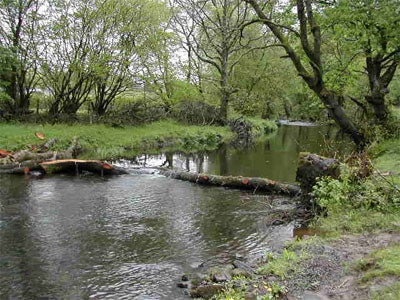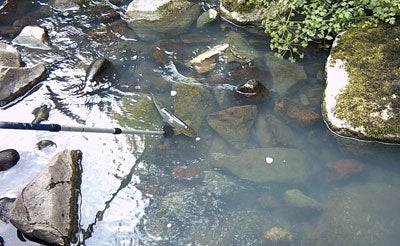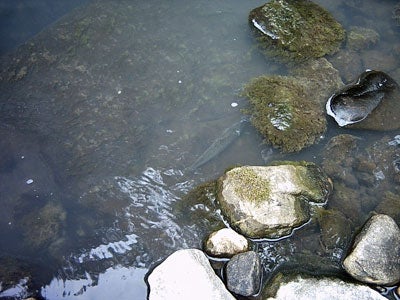ON SUNDAY MORNING at about 9.45 Tony Rees MBE received a phone call from a local farmer to inform him that the river Taf Fechan, that rises in the Brecon Beacons just below Pen-y-Fan, was running white.
Tony rang me and together we rushed up to the river. When we got there the river was running white but we could see no dead fish, although we did see fish just under the surface looking distressed. We followed the river up to see where the colour was coming from and realised it was coming either from the dam or the water works at the bottom of the dam at Pontsticill, and it was here that we saw the first of the dead fish.
We then went to an area where we could obtain a phone signal and phoned the Environment Agency Wales to report the fish kill, we subsequently learnt that United Utilities had already informed the Environment Agency Wales that there was a pollution incident. We walked various parts of the river and everywhere the aluminium sulphate was present there were either distressed or dead fish. We informed the local council to open the feeder sluice to stop the water from the river entering Cyfarthfa Park Lake where there are thousands of coarse fish. This they did, stopping a potentially bigger disaster.
Having spent the last five years improving the environment for the fish in the top three kilometres of the river, it is heart breaking to see all the fish dead and we now have a major mountain to climb to bring the river back. We recently won an award from the Wild Trout Trust, where we came joint second for restoring this river. It is also devastating for Wild Trout Trust, Orvis, General Dynamics, Environment Agency Wales who had put money and support into this project. This will also impact on all the otters, kingfishers, dippers, herons and other wild life that predates on the life in the river. We were told in the spring that nothing like this could ever happen, the backwash water was being recycled, none was entering the river and Pontsticill was a totally dry site. They said that all the site risk assessments had been done, that no dirty water or pollutant could ever enter the river again. After the heavy rains in May and the constant floods the bed of the river had been scoured and the gravels were looking nice and clean and we were anticipating a very good winter spawning season ahead. Sadly this will now not happen. We now have to sit down and consider our options for the revival of the river. This summer we had seen visitors from as far away as Holland, who had stayed in local hotels, eaten in local restaurants, drunk in local pubs and shopped locally. All this will now stop. So this is not just an environmental disaster, but also an economic disaster. |
Welcome!Log into your account













